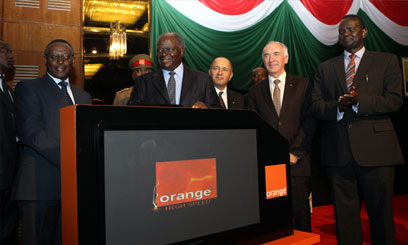NAIROBI, Kenya Sep 7- President Mwai Kibaki has once again directed the Ministry of Information and Communications to ensure that all unregistered mobile numbers are switched off.
This comes as efforts to have such numbers de-registered failed on legal grounds after a similar directive was issued in 2009.
The government through the Communications Commission of Kenya had given a July 30, 2010 deadline for this to be effected, but lack of a legal framework to support the deactivation saw the directive stall.
On Wednesday, however, the President revisited the directive saying unregistered phone numbers should not be allowed to operate.
“I once more direct the Ministry of Information and Communication to ensure that there is no phone number in use that is not registered. There is now a legal framework to protect service providers from unnecessary legal suits,” President Kibaki said.
When delivering the 2011/2012 Budget, Finance Minister Uhuru Kenyatta also issued guidelines that would help in curbing the use of unregistered SIM cards.
Mr Kenyatta said that it would be a requirement for SIM card vendors to register the cards before issuing them to consumers.
President Kibaki said the directive was geared towards safeguarding the Kenyan public from criminals and reduce phone related crime.
At the time the directive was first issued, there were rising cases of kidnappings where criminal gangs would use different unregistered mobile phone numbers to threaten the victims’ families.
Mobile phone users will be required to furnish operators with their names, postal and physical addresses, date of birth and alternative telephone numbers, as well as their identity card numbers.
The legislation is expected to force mobile service operators to set up and maintain a database with information on their subscribers, a move that will capture personal details of the estimated 22 million mobile phone users.
At the same time, the president also directed the Ministry of Higher Education, Science and Technology to transform two public universities into incubation hubs for technology developers.
This is part of the government’s strategy of developing the country into a knowledge-based economy by developing capacity for people to harness their skills.
President Kibaki said an incubation centre would be provided to enable entrepreneurs conduct research and development in a professional, conducive environment under guidance from established specialists.
“The primary aim of these institutes is to focus research on science and technology and produce competent graduates who can sustain our economy in the days to come. We must all work together to develop home-grown capacity in these new technologies,” he said.
He was speaking while officiating the launch of Telkom Kenya’s 3G network.
With the potential to go up to 21 megabits per second (Mbps), the operator is looking at offering fast Internet speeds making it possible for customers to derive maximum data value from the network.
Speaking during the launch, Telkom Kenya Chief Executive Officer Mickael Ghossein said investment in boosting its data services is crucial, as it is poised as the next sphere of competition for telecommunication operators as margins from voice revenue continue to thin out.
“In line with our strategy, I can confirm that indeed a new internet era begins today, that will be characterised by Orange steadily taking the lead in offering innovative products and services, providing simplicity through our customer experience while maintaining our value proposition to the customer,” Mr Ghossein said.




































